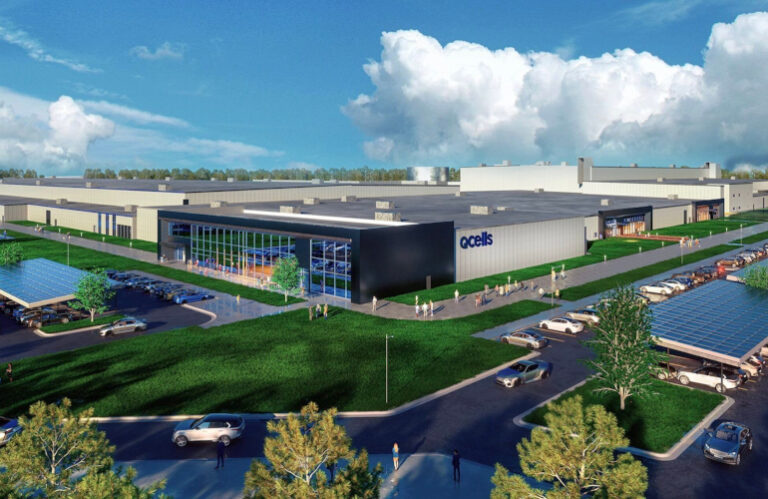
A view of Qcells’ Cartersville factory, announced in January 2023.
As part of the Biden-Harris Administration’s Investing in America agenda, the Department of Energy’s (DOE) Loan Programs Office (LPO) today announced a conditional commitment for a loan guarantee of up to $1.45 billion to Qcells, a leading North American crystalline silicon solar energy company. manufacturer. The loan guarantee will support Qcells’ supply chain facility in Cartersville, Georgia, which will produce ingots, wafers, cells and finished solar panels. The site is expected to begin producing blocks, wafers, cells and panels by the end of 2024.
The facility will be the largest ingot and wafer facility ever built in the United States and will restore critical parts of the domestic solar supply chain and strengthen the United States’ status as a global clean energy leader. The plant will also be the first fully integrated, silicon-based solar manufacturing facility built in the United States in more than a decade, helping to address gaps in the domestic solar supply chain.
Once fully operational, the facility is expected to produce 3.3 GW of solar panels per year, enough to supply panels to half a million American households. Qcells’ other solar factory, opened in 2019, is located an hour north of the facility’s location in Dalton, Georgia. The experience gained from operating the Dalton facility, which has recently been expanded to produce a total of 5.1 GW of solar panels per year, will benefit this new project.
The Cartersville plant will be the first vertically integrated facility in the United States to produce ingots, wafers, cells and panels under one roof in more than a decade, strengthening domestic supply chains while creating new economic opportunities for local and surrounding communities. Qcells will make larger wafer sizes that reduce costs and improve product performance.
The project will also help build the U.S. solar industry while increasing manufacturing capacity for solar components produced largely in China and Southeast Asia, increasing the resilience of the domestic supply chain and reducing costs for customers and communities across the United States.
Projects like the one announced today will take advantage of the Section 45 Advanced Manufacturing Production Tax Credit, also known as 45X, created by President Biden’s Inflation Reduction Act (IRA), which incentivizes domestic manufacturing at every step of the solar supply chain . In addition, the solar panels produced at the Cartersville facility will help solar developers qualify for the IRA’s domestic content incentive for clean energy production and investment tax credits. This bonus credit will encourage solar developers to purchase U.S. manufactured products and components. Since the arrival of the IRA, more than 325 GW of manufacturing capacity has been announced across the solar supply chain, representing more than 31,000 potential jobs and nearly $16 billion in announced investments in 111 new facilities or expansions – underscoring how the Investment in America agenda grows America’s clean economy. energy economy and catalyzing historic levels of private sector investment across the country.
The solar panels produced by the Cartersville plant will be used for distributed and utility-scale projects. Qcells is also one of the ten largest utility-scale project developers for both solar and storage in the United States, with more than 2 GW of developed or constructed projects and a project development pipeline of more than 10 GW. The company has entered into an eight-year, 12 GW solar and engineering, procurement and construction (EPC) agreement with Microsoft, to be fulfilled with solar panels made in Cartersville.
The loan guarantee would be offered through LPO’s Title 17 Clean Energy Financing Program, which includes financing opportunities for innovative energy and supply chain projects and projects that reinvest in existing energy infrastructure.
As part of the Biden-Harris Administration’s efforts to build an equitable and inclusive clean energy future, LPO borrowers are expected to develop and ultimately implement a comprehensive Community Benefit Plan (CBP). CBPs ensure that borrowers collaborate meaningfully with community and labor market stakeholders to create good-paying jobs and improve the well-being of residents and workers. Qcells Georgia CBP outlines strong community and labor involvement; quality jobs; diversity, equity, inclusion and accessibility (DEIA); and commitments in support of President Biden and Vice President Harris’ Justice40 Initiative. The Justice40 Initiative, established by Executive Order 14008, aims to ensure that 40% of the total benefits from select federal investments in climate, clean energy and other areas flow to underserved communities that are marginalized by underinvestment and overburdened by pollution. According to the Climate and Economic Justice Screening Tool, the project is located near underserved communities with low incomes and housing, transportation and healthcare burdens.
Qcells’ new factory will benefit the residents of Cartersville (about 45 miles from Atlanta) and other nearby communities. Approximately 40 to 50% of the construction work has been awarded to local contractors, including contractors from Atlanta, Georgia and Chattanooga, Tennessee. The construction contractor is also working with Kennesaw State University in Georgia to hire recent construction management graduates. Qcells Georgia plans to offer job training and apprenticeships to local Cartersville residents facing barriers to employment.
While this conditional commitment indicates DOE’s intent to finance the project, DOE and the company must meet certain technical, legal, environmental and financial conditions before the Department enters into final financing documents and funds the loan.
News release from the DOE Loan Programs Office (LPO)


